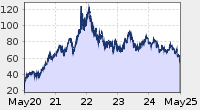Oil’s biggest annual rally since 1999 is poised to continue with gains of at least 19 percent next year as the global economy recovers and OPEC curtails production, the most accurate crude forecasters say.
Societe Generale SA’s Mike Wittner and Hannes Loacker at Raiffeisen Zentralbank Oesterreich AG, whose predictions this year that were within 9 percent of market levels, now say oil will average $92.50 and $88, respectively, in the fourth quarter of 2010, up from current prices of about $74 in New York. The median Wall Street estimate is for an increase to $83.
Oil is set to rise as China and India lead the world economy from its biggest economic shock since World War II, while the Organization of Petroleum Exporting Countries caps output, Wittner and Loacker said. Analysts say OPEC will keep supply targets unchanged at a meeting in Luanda, Angola, tomorrow, even as the International Energy Agency predicts fuel consumption will rise 1.7 percent next year.
“With global demand growing and OPEC holding production flat, stockpiles are going to come down, and that’s bullish for prices,” said Wittner, 48, the head of oil market research at Societe Generale in London. Commodities will also benefit from the weak dollar and U.S. interest rates close to zero percent, he said.
Iran-Iraq
Oil futures jumped 5 percent last week, the first weekly gain in a month, after Iranian forces occupied an oil well in neighboring Iraq, raising concern tensions between the two OPEC nations would disrupt supplies. The Iranian troops left the well Dec. 19, Iraq’s deputy minister of oil Abdul Kareem al-Luaibi told reporters in Baghdad yesterday.
Wittner, an analyst at the U.S. Central Intelligence Agency during the 1980s and the IEA in Paris between 1997 and 2002, said purchases by hedge funds and investors seeking protection from inflation will support prices.
“In contrast to some other banks, we acknowledge quite openly, and believe, that non-fundamental factors do play a role in setting oil prices,” said Wittner, who also worked at Koch Supply and Trading Co. and Credit Agricole SA’s investment banking unit Calyon, before joining SocGen in October 2007.
Oil futures have risen 66 percent this year because of OPEC’s output cut and economies recovering from the first global recession since World War II. The IEA forecasts consumption will increase in 2010, the first gain in three years.
Hurting Airlines
Higher oil prices will reward producers from Saudi Arabia to Exxon Mobil Corp., while hurting airlines that the International Air Transport Association forecast will lose $5.6 billion next year.
“Resources are getting scarce, especially if we go out two to three years from now,” said Gordon kwan, an analyst at Mirae Asset Securities in Hong Kong, who worked in Alaska as an engineer at BP Plc’s Prudhoe Bay, the biggest U.S. oil field.
Prudhoe Bay and its satellites pumped 357,360 barrels a day on Dec. 17, according to Alaska’s Department of revenue. In the 1980s, daily production was 1.5 million barrels a day.
“Right now scarcity is not a popular word because there’s plenty of inventory in the tanks,” Kwan said. “But once we have a synchronized global economic recovery, maybe 2011 onward, then we’ll see the word scarce coming into the picture.”
Oil Price Rallies
Monthly oil contracts for late 2010 trade between $75 and $80, limiting the potential returns for investors. A 20 percent rally from current levels would lag behind the 57 percent gain in 2007 and 40 percent in 2005. Last year, oil started at $99.62 and rose as high as $147.27 before crashing and ending the year at $44.60 a barrel.
The third most-accurate oil forecaster, Commerzbank AG senior analyst Fugen Weinberg, predicts oil will fall to $59 in the fourth quarter of 2010 because OPEC will increase supplies.
“Next year, I see risk from the downside,” Weinberg said. “OPEC discipline is receding, and I think this will continue.”
Until there’s evidence of improved demand in developed nations “and real discipline from OPEC, then prices have increased prematurely,” Weinberg said.
For the Bloomberg survey, analysts’ forecasts between December 2008 and January 2009 were compared with actual prices. The average total for the 21 analysts surveyed was off by 18 percent, with Economist Intelligence Unit, Natixis Bleichroeder Inc., JPMorgan Chase & Co. and Deutsche Bank AG farthest away.
Dollar Impact
Deutsche Bank predicts a decline of 19 percent to an average of $60 a barrel a year from now as the dollar strengthens.
“In all likelihood the dollar will be putting downward pressure on the oil market, or at least take away a support,” said Deutsche Bank Chief Energy Economist Adam Sieminski in Washington.
OPEC will probably make no changes to output quotas when it meets tomorrow in Luanda, according to a Bloomberg News survey of 36 analysts last week. Last month the group pumped about 2 million barrels a day less than it did a year earlier as it works through a promised 4.2 million barrel-a-day supply cut.
The group has a consensus to make “no change” to quotas, OPEC Secretary-General Abdalla el-Badri told reporters in Luanda today.
Members from Algeria, Kuwait, Libya and Qatar have also signaled no need to change quotas, while Iran and Nigeria said the group’s target is unlikely to be altered. Venezuela wants to keep prices above $70.
According to Loacker, who joined Raiffeisen seven years ago, an OPEC decision to hold supply little changed at a time of rising consumption will tighten supplies as output from countries outside the organization lags behind estimates.
“Some forecasts are too optimistic” on non-OPEC supply growth, he said. “There is potential for less good surprises in production.”
Crude Oil and Commodity Prices
December, Monday 21 2009 - 13:08:53
Crude Oil $73.30 ▼0.06 0.08% 13:09 PM EST - 2009.12.21 




Source-www.bloomberg.com





No comments:
Post a Comment